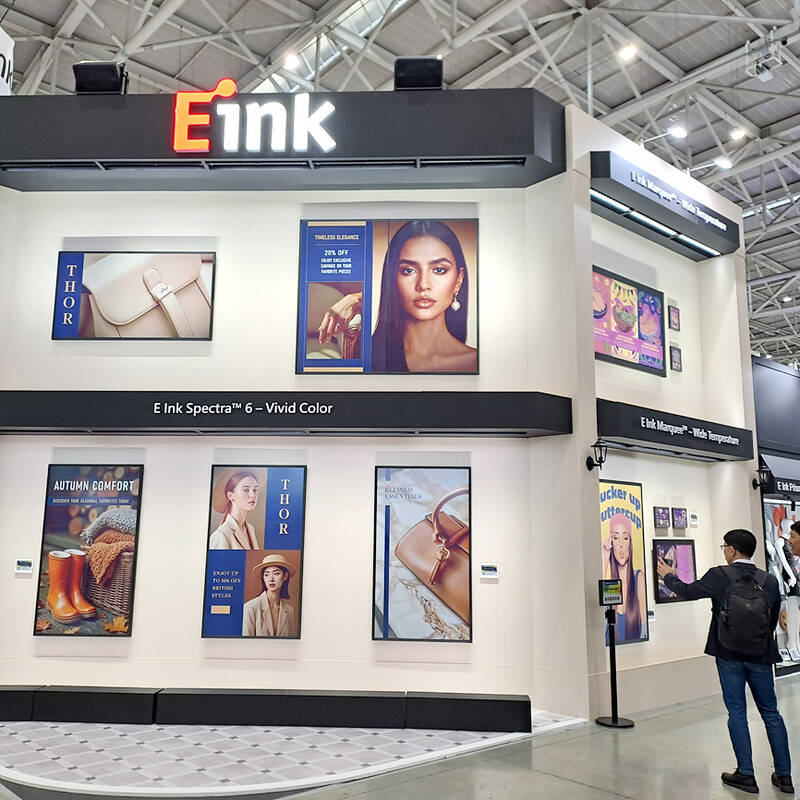E Ink Holdings Inc (元太科技), the world’s largest e-paper display supplier, yesterday said it expects moderate revenue decline in the second half of the year, as some e-reader customers have become more conservative about consumer spending amid concerns over US tariffs.
The company’s second-quarter revenue reached a peak for the year to date at NT$10.63 billion (US$354.81 million), driven by front-loading and model transition to color screens from monochrome in the e-reader and e-note markets, it said.
“The market sentiment shows that most people are taking a wait-and-see attitude ... and are relatively conservative about the second half, especially about the consumer sector,” E Ink chairman Johnson Lee (李政昊) told an online investors’ conference.

Photo: CNA
E Ink’s order intake might weaken in the fourth quarter, but it expects an improvement in the first quarter next year, given that most customers are optimistic about the industry’s growth trend, Lee said.
The fourth quarter is a low season for the electronic shelf label (ESL) business, but customers, including system integrators and retailers, are positive about ESL adoption in the long term, he said.
Overall, the company is optimistic about its full-year revenue growth after sales in the first seven months jumped 38.43 percent annually to NT$22.58 billion, it said.
E Ink’s production lines are all fully utilized, which makes it hard to catch up with demand, the company said.
It expects its new production line, called H5, to enter volume production this month or next month after a delay early this year due to technology bottlenecks, it said.
E Ink is investing in its research-and-development team in San Jose, California, and is considering building a pilot production line there as part of the company’s increasing investments in the US, Lee said.
Despite foreign exchange losses of NT$2.14 billion in the second quarter due to the drastic appreciation of the New Taiwan dollar against the US dollar, E Ink’s net profit in the quarter grew 47 percent to NT$2.97 billion from NT$2.02 billion in the same quarter last year.
Earnings per share rose to NT$2.58 from NT$1.76 for the same period.
Gross margin last quarter jumped to 60.3 percent from 47.25 percent a year earlier thanks to a favorable product mix and improved operational efficiency, it said.

PERSISTENT RUMORS: Nvidia’s CEO said the firm is not in talks to sell AI chips to China, but he would welcome a change in US policy barring the activity Nvidia Corp CEO Jensen Huang (黃仁勳) said his company is not in discussions to sell its Blackwell artificial intelligence (AI) chips to Chinese firms, waving off speculation it is trying to engineer a return to the world’s largest semiconductor market. Huang, who arrived in Taiwan yesterday ahead of meetings with longtime partner Taiwan Semiconductor Manufacturing Co (TSMC, 台積電), took the opportunity to clarify recent comments about the US-China AI race. The Nvidia head caused a stir in an interview this week with the Financial Times, in which he was quoted as saying “China will win” the AI race. Huang yesterday said

Japanese technology giant Softbank Group Corp said Tuesday it has sold its stake in Nvidia Corp, raising US$5.8 billion to pour into other investments. It also reported its profit nearly tripled in the first half of this fiscal year from a year earlier. Tokyo-based Softbank said it sold the stake in Silicon Vally-based Nvidia last month, a move that reflects its shift in focus to OpenAI, owner of the artificial intelligence (AI) chatbot ChatGPT. Softbank reported its profit in the April-to-September period soared to about 2.5 trillion yen (about US$13 billion). Its sales for the six month period rose 7.7 percent year-on-year

Nissan Motor Co has agreed to sell its global headquarters in Yokohama for ¥97 billion (US$630 million) to a group sponsored by Taiwanese autoparts maker Minth Group (敏實集團), as the struggling automaker seeks to shore up its financial position. The acquisition is led by a special purchase company managed by KJR Management Ltd, a Japanese real-estate unit of private equity giant KKR & Co, people familiar with the matter said. KJR said it would act as asset manager together with Mizuho Real Estate Management Co. Nissan is undergoing a broad cost-cutting campaign by eliminating jobs and shuttering plants as it grapples

MORE WEIGHT: The national weighting was raised in one index while holding steady in two others, while several companies rose or fell in prominence MSCI Inc, a global index provider, has raised Taiwan’s weighting in one of its major indices and left the country’s weighting unchanged in two other indices after a regular index review. In a statement released on Thursday, MSCI said it has upgraded Taiwan’s weighting in the MSCI All-Country World Index by 0.02 percentage points to 2.25 percent, while maintaining the weighting in the MSCI Emerging Markets Index, the most closely watched by foreign institutional investors, at 20.46 percent. Additionally, the index provider has left Taiwan’s weighting in the MSCI All-Country Asia ex-Japan Index unchanged at 23.15 percent. The latest index adjustments are to